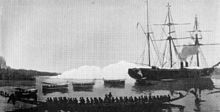Bonabéri
|
Bonabéri parish of Douala |
|
|---|---|
| Coordinates | 4 ° 4 '44 " N , 9 ° 40' 0" E |
| height | 20 m above sea level NHN |
| surface | 35 km² |
| Residents | 395,536 (2005) |
| Population density | 11,301 inhabitants / km² |
| politics | |
| mayor | Edouard Hervé Moby Mpah (2020-2025) |
Bonabéri (also known as "Douala IV") is one of the six district communities ( French commune d'arrondissement ) of the Cameroonian city of Douala . Like Douala itself, the district municipality is located in the Littoral region in the Wouri district and is the only one in the city that lies on the right (western) bank of the Wouri River of the same name . It is now connected by two bridges with downtown Douala and the other parts of the city, including the airport of Douala . National road 3 leads over the newer bridge through Bonabéri to the west.
In order to subdivide the urban community of Douala, the name "Douala IV" was introduced for the district municipality during an administrative reform. The district municipality has been headed by a mayor since 1987. The town hall is located in the Bonassama subdistrict. Bonabéri is a mixed neighborhood that combines industrial areas, residential areas and spontaneous settlements.
Due to its location, Bonabéri is considered the gateway to the west of the country and is therefore important for the transit of goods to or from the western coastal region, i.e. the predominantly English-speaking areas of Cameroon. Due to its geographic location, the district is bilingual. The port is the main port of entry in Cameroon.
history
Like many other districts of Douala, the origin of Bonabéris goes back to an initially independent fishing settlement on the banks of the Wouri. This settlement was the 18th century "Hickory Town" (by European explorers of the coast of Cameroon in mid German Hickorydorf called). The settlement was inhabited by the Bonabéri and the Bonanjo, both tribes of the same Duala clan.
In the autumn of 1884 the German West African cruiser squadron cruised off the coast of Cameroon. The reason for this was attacks by the indigenous population on German trading establishments in the area, which had caused the German trading companies to ask the German government for support and protection, which was finally approved by the Reich government under Otto von Bismarck . In the course of the pacification of the area, the ships dropped a landing corps at Hickory Town and fighting broke out in which the corvette Olga shot at the settlement on December 21, 1884 with her cannons.
As a result, the area around the Wouri, like all of Cameroon later, became part of German rule and finally a German colony , in 1919 first part of the French colonial empire and then from 1960 part of the independent state of Cameroon.
From the 1980s onwards, a large number of the city's industries settled in the district and took advantage of the cheaper land prices. This activity then drew the population to this Wouri bank, which led to the overloading of the Wouri Bridge, which was completed in 1954, and often catastrophic traffic jams. From 2017, the situation was relieved by building another bridge.
Neighborhoods
The main district of Bonabéri consists of ten sub-districts: Bojongo, Bonamatoumbe, Bonamikano, Bonassama, Bonendale I, Bonendale II, Djebale I, Djebale II, Mambanda, Nkomba.
economy
The industrial area of Bonabéri ( ZIBO ), with an area of 192 hectares, extends on the banks of the Wouri River, downstream of the new bridge. It forms a diversified industrial zone of 70 companies from different sectors: steel works, food industry, construction and public works, breweries, cement works (including from the French building materials group Lafarge ), car dealerships, fertilizer and pesticide factories , metallurgy, sawmills, tanneries, waste disposal.
Personalities
- Drusille Ngako (* 1987), soccer player
Views of Bonabéri
Bush taxis in Bonabéri
(2016-2017)
swell
- Municipality of Douala, urban planning documents [archive]
- Guy Mainet: Douala, croissance et servitudes. L'Harmattan. Paris. 1986.
- Kengne Fodouop: Bonaberi dans Douala: autonomie et interdépendance. Université Bordeaux 3rd 1977.
- Keyword: Bonaberi. In: Heinrich Schnee (Ed.): German Colonial Lexicon. Quelle & Meyer, Leipzig 1920, Volume I, p. 229 ( online ).








